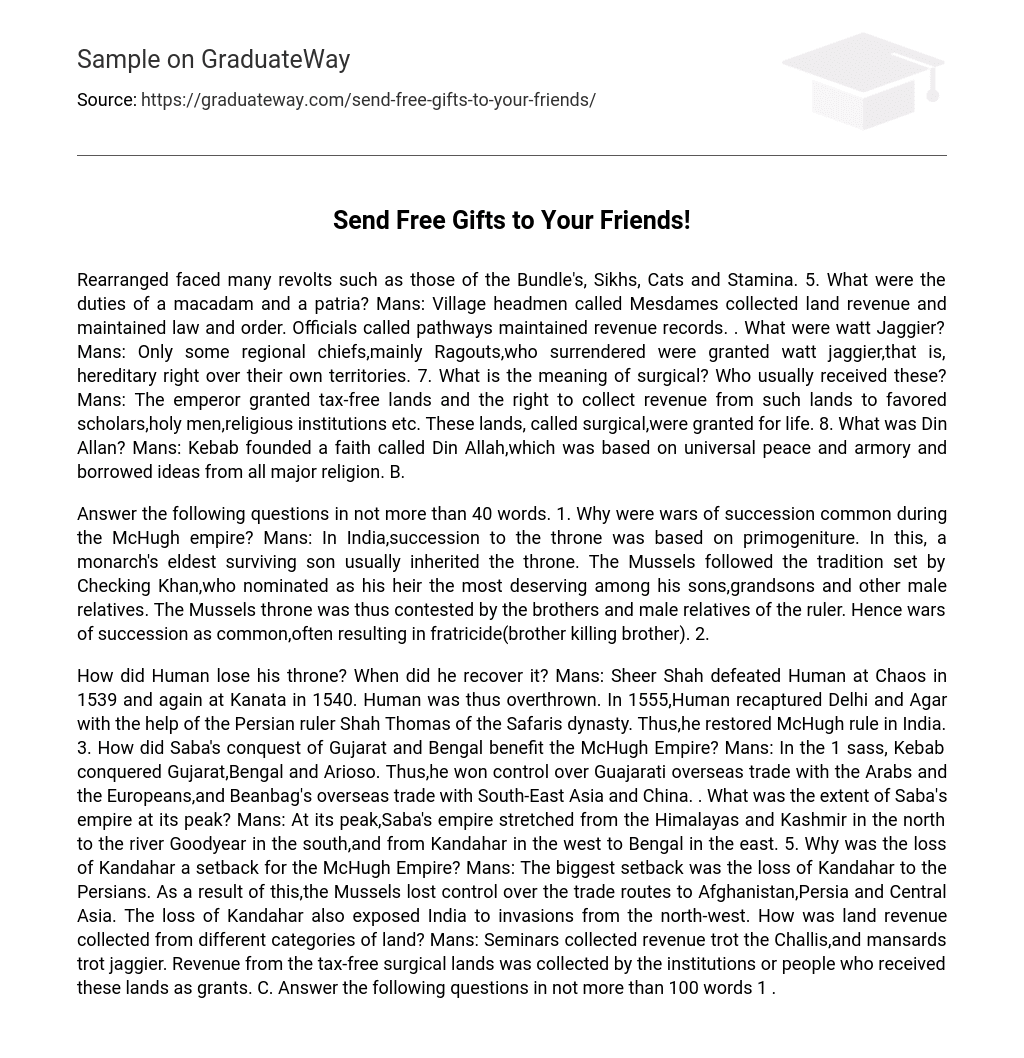Rearranged faced many revolts such as those of the Bundle’s, Sikhs, Cats and Stamina. 5. What were the duties of a macadam and a patria? Mans: Village headmen called Mesdames collected land revenue and maintained law and order. Officials called pathways maintained revenue records. . What were watt Jaggier? Mans: Only some regional chiefs,mainly Ragouts,who surrendered were granted watt jaggier,that is, hereditary right over their own territories. 7. What is the meaning of surgical? Who usually received these? Mans: The emperor granted tax-free lands and the right to collect revenue from such lands to favored scholars,holy men,religious institutions etc. These lands, called surgical,were granted for life. 8. What was Din Allan? Mans: Kebab founded a faith called Din Allah,which was based on universal peace and armory and borrowed ideas from all major religion. B.
Answer the following questions in not more than 40 words. 1. Why were wars of succession common during the McHugh empire? Mans: In India,succession to the throne was based on primogeniture. In this, a monarch’s eldest surviving son usually inherited the throne. The Mussels followed the tradition set by Checking Khan,who nominated as his heir the most deserving among his sons,grandsons and other male relatives. The Mussels throne was thus contested by the brothers and male relatives of the ruler. Hence wars of succession as common,often resulting in fratricide(brother killing brother). 2.
How did Human lose his throne? When did he recover it? Mans: Sheer Shah defeated Human at Chaos in 1539 and again at Kanata in 1540. Human was thus overthrown. In 1555,Human recaptured Delhi and Agar with the help of the Persian ruler Shah Thomas of the Safaris dynasty. Thus,he restored McHugh rule in India. 3. How did Saba’s conquest of Gujarat and Bengal benefit the McHugh Empire? Mans: In the 1 sass, Kebab conquered Gujarat,Bengal and Arioso. Thus,he won control over Guajarati overseas trade with the Arabs and the Europeans,and Beanbag’s overseas trade with South-East Asia and China. . What was the extent of Saba’s empire at its peak? Mans: At its peak,Saba’s empire stretched from the Himalayas and Kashmir in the north to the river Goodyear in the south,and from Kandahar in the west to Bengal in the east. 5. Why was the loss of Kandahar a setback for the McHugh Empire? Mans: The biggest setback was the loss of Kandahar to the Persians. As a result of this,the Mussels lost control over the trade routes to Afghanistan,Persia and Central Asia. The loss of Kandahar also exposed India to invasions from the north-west. How was land revenue collected from different categories of land? Mans: Seminars collected revenue trot the Challis,and mansards trot jaggier. Revenue from the tax-free surgical lands was collected by the institutions or people who received these lands as grants. C. Answer the following questions in not more than 100 words 1 . Describe the main features of central and provincial administration under the Mussels. Mans: Central and Provincial administration under the Mussels: The king controlled the entire administration. He was assisted by a council of ministers.
Among his ministers were the waking (prime minister), the Dianna or hazier ( minister of revenue and expenditure), the Mir basic (minister of military administration), the Mir Assam ( minister of royal household) and the Sad ( minister for enforcing the Shari,that is,lilacs law). The empire was divided into scubas (preadolescence governed by a suburban. The scubas were divided into karakas (districts) and the karakas,into paragons,each made up of a number of villages. Officials were posted in every administrative division. They were paid regular cash salaries.
Sometimes they received Jaggier (land grants) for extinguished service. 2. Write briefly about Saba’s mansard system. Mans: Kebab introduced the mansard system . This was a way of organizing the nobility and the army. It was introduced as a way to grade service. The word ‘mans’ meaner a place or position and therefore it meaner a rank in the mans system under the Mussels Mans denoted three things:-(I) It determined the status of its holder (the mansard) in the official hierarchy. It fixed the pay of the holder. (iii) It also laid upon the holder the obligation of maintaining a specified number of horses and equipment.
The mansards were classified into three, groups:(a) Those with horsemen (swear) equal to the number of the cat (b) Those with horsemen half or more than half of the number of the cat, and(c)Those whose swear rank was less than half of their cat rank. According to Babul Faze,it ranged from 10 horsemen to 10,000 horsemen. A mansard also had to maintain a fixed number of elephants,camels and cart. According to an estimate,Saba’s mansards rice the highest salaries in the world at that time. 3. What were the main features of Saba’s land-revenue system? Who devised this yester?
Mans: Saba’s land-revenue policy was framed by Raja Toward Mall. It was based on Sheer Shah’s land-revenue system. Each peasant’s land was measured and its yield assessed. Toward Mall calculated the state’s share of each crop through the Saba system. According to this system,data regarding the area cultivated,actual produce and local prices was collected for each crop for ten years (1570-1580). The average produce and price of each crop in these ten years was calculated. The state’s share was then fixed at about one-third of the average produce. Revenue could be paid in ash or kind.
Farmers could get loans from the state. The Saba system was applied in the provinces lying between Lahore and Allahabad,and in Mammal and parts of Gujarat. These provinces were divided into revenue circles,and separate revenue rates were fixed for different circles. During Shah Khan’s reign the Saba system was extended to the Decca provinces. In the second half of the seventeenth century,McHugh revenue demands increased considerably and the Mussels officers became oppressive. As a result,there were frequent peasant uprisings in both North India and the Decca.





